Belinda is hurt. She has been working on Picture Frame for months, and she’s proud of having elevated it above the level of a game. She’s annoyed with herself for not having done it justice, and she can feel in her throat the possibility of tears if she tries to speak. She would be grateful if Matthew would say something, do something, anything to end this torture, change the subject, rescue her. He doesn’t, but the waiter does.
“Excuse me,” says the waiter. “Am I interrupting?”
Belinda takes a deep breath, shakes her head.
“Would you like to order? Or would you like some more time?”
“More time,” says Harold. “I haven’t even looked at the menu yet.” Harold picks up his menu, barely glances at it, and asks Matthew, “Have you been to Italy?”
“I’ve never been anywhere,” says Matthew. And he thinks, It’s true. He hasn’t been anywhere. He and Liz spent a weekend in Montreal now and then, and Matthew has traveled on business, but he doesn’t feel as if he has really been anywhere. He makes visits to Hong Kong and Taiwan and Mexico to check on the manufacturing of toys, but they are like inspection tours of a huge plant, not like traveling in foreign cultures. Suddenly he misses what he never had, the footloose travel of a young man, afoot in Europe, a student wandering around, having experiences that he would never forget.
“I hear that Italy is extremely expensive now,” says Gwen. “When we were in Italy, I think we probably never spent more than three dollars on a meal — ”
“Really?” says Harold, as if astonished. “Were we traveling together?”
“Oh, come on, Harold,” says Gwen. “It’s true — ”
“Well, it’s almost true,” says Harold.
“All right. We never spent more than five dollars.”
“That’s true.”
Belinda finishes her drink. She looks around for their waiter. She would like to eat and run.
“And for that we used to have wine,” says Gwen, “and huge meals. I mean, I thought they were going to charge us extra on the plane, for the weight we’d gained.”
“Or duty,” says Harold. He’s almost bouncing on his chair. To Belinda, he looks like a boy who has to go to the bathroom, but he’s merely full of something he thinks is funny. “Say,” he says in a tone of official suspicion, “isn’t that Italian fat you’re carrying there?” He makes a tummy-poking gesture. Matthew gets it, after a moment’s uncertainty: Harold is supposed to be a customs officer interrogating Harold and Gwen on their return from Italy. Matthew laughs, after a fashion; to be precise, he smiles and makes a snorting sound. He too looks for the waiter.
Harold doesn’t quit. “Why, ah, yes, ah, the missus and I really tucked into the pasta — ” Now Matthew’s confused again. Harold can’t be playing himself. This must be a parody of what Harold supposes a middle-class Midwesterner to be like. Belinda’s fascinated now. She wonders why Gwen has stayed married to this bloated buffoon. Maybe he has a giant cock, she tells herself, and she giggles. Her giggle encourages Harold.
“You’re going to have to declare that, you know,” he continues. Now Gwen is giggling, out of all proportion to the humor of Harold’s routine, giggling like a crazy woman. She seems to think Harold is hilarious, thinks Belinda. Is he? I can’t tell. I must be losing my perspective on what’s funny.
“Oh, Harold,” says Gwen. “You’re crazy. But anyway, our friends Edith and Dan just came back from a week in Italy, and they said they spent a hundred and forty dollars on lunch. Lunch!”
“But we went when we were kids,” says Harold. “We only had five dollars to spend on a meal.”
“But a hundred and forty dollars on lunch. Are things that expensive, or are Dan and Edith just gluttonous?” She laughs at this; she’s surprising herself. She’s usually content to leave the wit to her husband. Perhaps she’s feeling a little loose because it’s her birthday. Maybe she should have one drink. Well, maybe not. “I mean, maybe they spend a hundred and forty dollars on lunch all the time. I don’t know. Can you do that?”
“Sure,” says Matthew.
[to be continued]
Have you missed an episode or two or several?
You can begin reading at the beginning or you can catch up by visiting the archive or consulting the index to the Topical Guide.
You can listen to the episodes on the Personal History podcast. Begin at the beginning or scroll through the episodes to find what you’ve missed.
You can listen to “My Mother Takes a Tumble” and “Do Clams Bite?” complete and uninterrupted as audiobooks through YouTube.
You can ensure that you never miss a future issue by getting a free subscription. (You can help support the work by choosing a paid subscription instead.)
At Apple Books you can download free eBooks of Little Follies and Herb ’n’ Lorna.
You’ll find overviews of the entire work in An Introduction to The Personal History, Adventures, Experiences & Observations of Peter Leroy (a pdf document) and at Encyclopedia.com.








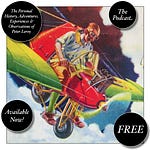
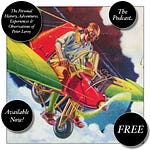
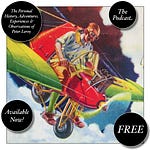
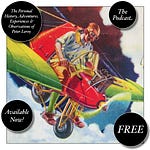

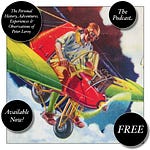
Share this post